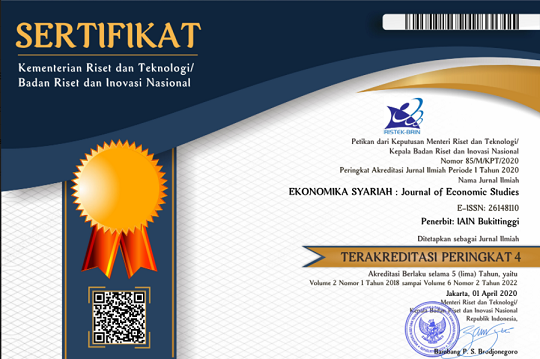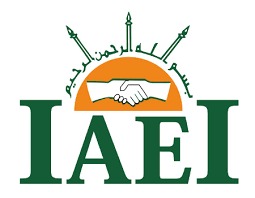Pengaruh Pengetahuan dan Sikap Terhadap Perilaku Memilih Bank Syariah Dengan Faktor Religiusitas Sebagai Moderating Variable
DOI:
https://doi.org/10.30983/es.v3i1.934Abstract
This study shows the relationship between knowledge and attitude towards the behavior of choosing Islamic banks with moderated religiosity. The study was conducted on 117 people who became customers of Islamic banks in four sub-districts located in the Agam Regency region which has a sharia bank office network, namely Lubuk Basung District, Baso District, Ampek Angkek Canduang District and Banuhampu District. The results of this study indicate that (1) knowledge has a positive and significant effect on the behavior of choosing Islamic banks with a value of P = 0.01, (2) the attitude has a positive and significant effect on the behavior of choosing Islamic banks with a value of P <0.01, (3) religiosity does not moderate relations between knowledge and behavior of choosing Islamic banks with a value of P = 0.46 this indicates that religiosity is not a moderator of the relationship between attitudes and behavior of choosing Islamic banks. (4) While the effect of moderating religiosity on the relationship between attitude and behavior of choosing Islamic banks is significant with a value of P = 0.03 and this shows that religiosity is able to moderate the relationship between attitudes and behavior of choosing Islamic banks.
References
Abhimantra, A. (2013). Analisis Faktor-Faktor Yang Mempengaruhi Nasabah (Mahasiswa) Dalam Memilih Menabung Pada Bank Syariah. Proceeding PESAT (Psikologi, Ekonomi, Sastra, Arsitektur dan Teknik Sipil).
Anam, C. (2016 ). Pengaruh Komitmen Beragama, Pengetahuan Agama, dan Orientasi Agama Terhadap Preferensi Masyarakat Pada Bank Syariah di Surabaya. Jurnal Studi Manajemen dan Bisnis.
Andriani, D. (2008). Preferensi Masyarakat Kota Medan Terhadap Bank Syariah, Jurnal Riset Akuntansi dan Bisnis.
Asmaun, S. (2011). Religusitas Perguruan Tinggi: Potret Tradisi Keagamaan di Perguruan Tinggi Islam. Malang: UIN Malang Press.
Bank Indonesia; Institut Pertanian Bogor. (2014). Bank Syariah : Potensi, Preferensi, dan Perilaku Konsumen Terhadap Bank Syariah di Wilayah Kalimantan Selatan.
Bank Indonesia; Universitas Andalas. (2005). Pengaruh Fatwa Mui Tentang Bunga Bank Haram Terhadap Keputusan Mahasiswa Fakultas Ekonomi Universitas Andalas Dalam Memilih Bank Di Kota Padang. Jurnal Bisnis dan Manajemen.
Ghozali, I. (2006). Struktural Equation Modelling Metode Alternatif dengan Partial Least Square PLS. Semarang: Penerbit UNDIP.
Ghufron, M. N., & Risnawati, R. (2010). Teori-Teori Psikolog. Yogyakarta: Ar-Ruzz Media.
Hasan, A., Subhani, M. I., & Osman, M. A. (2012). Consumer Criteria For The Selection of an Islamic Bank : Evidence From Pakistan. International Reseach Journal of Finance and Economics.
Jalaluddin. (2005). Psikologi Agama. Jakarta: RajaGrafindo Persada.
Kotler, P. (2002). Pemasaran di Indonesia : Analisa Perencanaan Implementasi dan Pengendalian. Jakarta: Salemba Empat.
Mangkunegara, A. A. (2002). Perilaku Konsumen, Edisi Revisi. Bandung : PT Refika Aditama.
Rachmawati, I. (2017). Analisis Pengaruh Promosi,Harga, Pengetahuan Produk, dan Pengetahuan Agama Terhadap Keputusan Nasabah Memilih Menabung di Bank BRI Syariah di Surabaya. Artikel Ilmiah.
Sholihin, M., & Ratmono, D. (2013). Analisis SEM-PLS dengan WarpPLS Untuk Hubungan Non Linier Dalam Penelitian Sosial dan Bisnis. Yogyakarta: Penerbit ANDI.
Sumarwan, U. (2011). Perilaku Konsumen : Teori dan Penerapannya Dalam Pemasaran. Bogor: Ghalia Indonesia.
Usman, H. (2015). The Role of Religious Norms On Selecting The Islamic Bank. Al Iqtishad.
Utami, W. (2015). Analisis Pengaruh Religiusitas, Kelompok Referensi dan Motivasi Terhadap Keputusan Menabung di Bank Syariah. Jurnal Wawasan Manajemen.
Yatim, R. (2001). Metodologi Penelitian. Surabaya: SR.
Yulianto, F. (2010). Analisis Pengaruh Faktor Bauran Pemasaran Terhadap Pertimbangan Nasabah Dalam Memilih Bank Syariah di Kota Medan. Wacana.
Downloads
Published
How to Cite
Issue
Section
Citation Check
License
Authors who publish with this journal agree to the following terms:
- Authors retain copyright and grant the journal right of first publication with the work simultaneously licensed under a Creative Commons Attribution-ShareAlike 4.0 International License that allows others to share the work with an acknowledgment of the work's authorship and initial publication in this journal.
- Authors are able to enter into separate, additional contractual arrangements for the non-exclusive distribution of the journal's published version of the work (e.g., post it to an institutional repository or publish it in a book), with an acknowledgment of its initial publication in this journal.
- Authors are permitted and encouraged to post their work online (e.g., in institutional repositories or on their website) prior to and during the submission process, as it can lead to productive exchanges, as well as earlier and greater citation of published work (See The Effect of Open Access).





